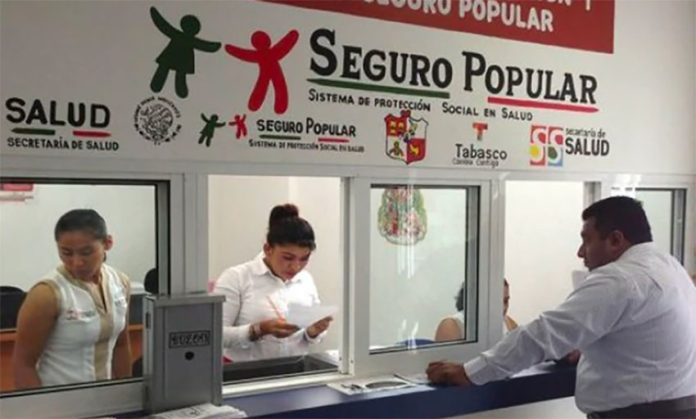Confusion continues to plague the launch of the federal government’s new universal healthcare scheme.
The National Institute of Health for Well-Being (Insabi), a new government department tasked with providing medical services to millions of Mexicans without insurance, started operations on January 1.
Almost two weeks later, hospital staff, patients and many members of the general public remain unsure about how the replacement for the Seguro Popular program actually works.
The newspaper El Economista reported that personnel at hospitals it visited have not received any clear, official information about the operation of the Insabi scheme, leaving them bewildered as to how it is supposed to function.
Staff at the Xoco General Hospital in Mexico City said that they are “completely disoriented” because the government hasn’t provided them with information about the scheme or sent officials to explain it to them.
The head of nursing at the Dr. Manuel González Rivera healthcare center, also located in the capital, gave a similar response when asked about the implementation of the Insabi health service.
“We haven’t been well informed,” said María Concepción Escalante Cruz. “We’re continuing to ask for [patients’] Seguro Popular [policies] . . .Their membership numbers are still valid; they were still making Seguro Popular identity cards in December . . .”
Escalante added that staff have been given no indication as to when they might receive training about the operation of the new service.
The administrator of the González Rivera center also said he didn’t know when training would occur, explaining that the only information he has received is that consultations that used to cost 6 pesos will now be free.
Similarly, the newspaper El Universal found that staff at other hospitals have little information and knowledge about how Insabi is supposed to operate and how people formerly covered by Seguro Popular can join.
At the Balbuena General Hospital, which provides primary and secondary healthcare services in the capital, a security guard told El Universal that joining the Insabi scheme wasn’t possible at the time because the office where the registration process takes place was closed.
With many healthcare professionals in the dark about the operation of the government’s new healthcare program, it’s unsurprising that people seeking medical treatment are also confused.
In addition to confusion, patients and their family members have also expressed anger because they had to pay for services and medical supplies they believed would be provided free of charge
President López Obrador said repeatedly last year that the Insabi scheme would be completely free, an assertion that the leader of the national health workers’ union described as an “information error.”
Fabiola Ríos told El Economista that the Xoco General Hospital wouldn’t enroll her son in the Insabi plan because the family lives in México state rather than Mexico City. She said she was informed that the surgery her son required would therefore cost between 5,000 and 6,000 pesos (US $265 to $320).
María de Lourdes, whose son is also hospitalized at the Xoco Hospital, said that care is being provided free of charge but added that she has spent more than 16,000 pesos (US $850) on medical supplies required for his treatment.
Patients and family members at several other healthcare facilities have made the same complaint.
At the San Carlos Hospital in Tizimín, Yucatán, a diabetes sufferer who required urgent surgery for a foot fracture was turned away because hospital staff determined that Insabi wouldn’t cover her expenses, the newspaper Diario de Yucatán reported.
María Damiana Euán Kuyoc was directed to seek treatment at a private clinic, where she was told that the cost of the surgery was 35,000 pesos (US $1,860).
The less than smooth implementation of the Insabi scheme, the government’s apparent failure to inform the public about it and the ensuing criticism all support an assertion last year by six former federal health secretaries that getting rid of Seguro Popular was a “crucial mistake.”
Two health secretaries from the administration of former President Felipe Calderón – who introduced the Seguro Popular program – two who served under ex-president Enrique Peña Nieto and one each from the administrations of Miguel de la Madrid and Vicente Fox said in a letter that eliminating Seguro Popular was to “annul one of the most important institutional advances” of the health system.
Calderón himself also challenged López Obrador’s decision to eliminate Seguro Popular and retaliated against the president’s frequent claim that the program wasn’t seguro (which can mean both insurance and reliable in Spanish) or popular.
“Since 2008, Seguro Popular covered all medicines and treatment for children and young people up to 18 years [suffering from] all kinds of cancer. Before [the program’s introduction] seven of every 10 children with leukemia died. After, seven of 10 survived . . . Yes it was seguro and yes it was popular,” he wrote in one of a series of 2019 Twitter posts defending the program.
Current opposition lawmakers have also been critical of the elimination of Seguro Popular, while governors in several states have indicated that they won’t sign on to the latter.
López Obrador said on Monday that there is no obligation for the states to join Insabi although the institute’s chief indicated that federal funds for free healthcare will only be provided after they sign agreements with the Mexican government.
The scheme is “voluntary, not obligatory,” the president told reporters. “. . . We can’t force anyone [to join]. The vast majority [of states] will work on this plan together so that medical care and medicines are free, we have the budget and it will be enough.”
A senior health official charged Tuesday that there was a campaign under way to sabotage the implementation of the new health scheme. The undersecretary in the Secretariat of Health said it appeared “a disinformation campaign is being orchestrated by someone,” possibly special-interest groups that are resisting the change.
Source: El Economista (sp), El Universal (sp), Diario de Yucatán (sp), Infobae (sp), El Financiero (sp)
